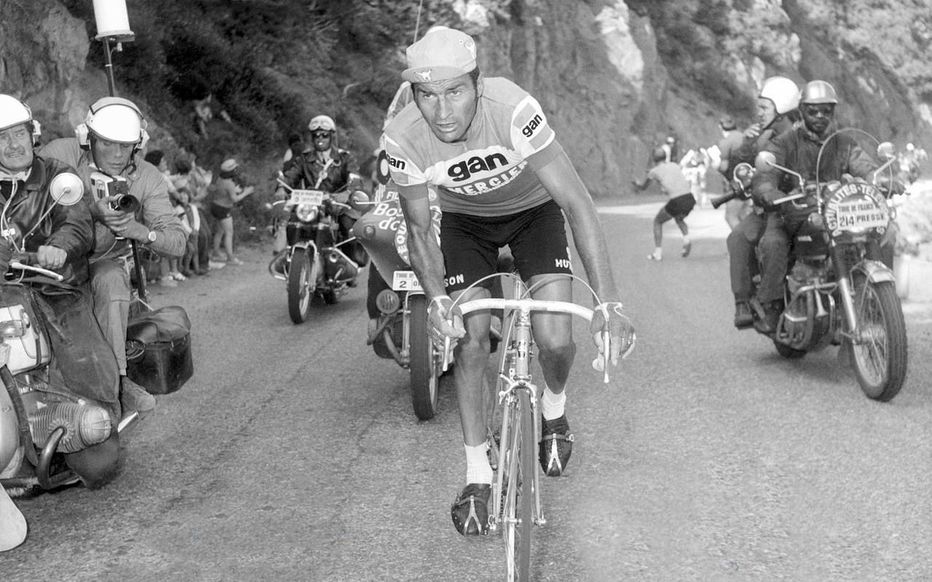Photo: Raymond Poulidor by Le Parisien
Eternally Second, Eternally Beloved.
For eighteen years he was there. Always, always, there. Jacques Anquetil, Eddy Merckx, Luis Ocana, you name the superstar and Raymond Poulidor was riding alongside them shoulder to shoulder. Over a stunningly long career that stretched from 1959 to 1977, his palmares might not have matched those of his illustrious rivals but he had something that cannot be rendered in figures and words: respect. Many of the aforementioned riders would undoubtedly say that they rode harder because Poulidor was right behind them.
Raymond Poulidor, who just passed away at the age of 83, may have earned respect from his fellow professionals, but from the French public he got more than that, he got love. The two are very different: Anquetil got respect, but was not loved. Poulidor received both. For an illustration of how much esteem Poulidor was held in, here’s a tale of two French cyclists in the mid 1960s.
By 1965 Anquetil was cycling’s dominant rider. He had won five Tours de France, two Giros (including the Tour-Giro double in 1964) and one Vuelta, eclipsing Coppi’s record of seven grand tour victories. Nevertheless, the diminutive Norman was not as popular as his more solidly-built arch-rival Poulidor. Perceived as aloof and calculating in carefully rationing effort to maximum advantage, he was regularly jeered and booed upon winning whereas Poulidor, “the eternal second”, was greeted with adulation. Anquetil’s manager, Raphael Geminiani hatched an audacious plan: set Anquetil up to ride—and hopefully win—the Dauphine Libere and Bordeaux-Paris double. It was a calculated move by Geminiani to assert Anquetil in the eyes of the public as the greatest French rider.
Anquetil did the double against all reason and odds and tearfully received the rapturous welcome in Paris that Geminiani had hoped for. The double had been accomplished. Never before, and never again, would a rider attempt such an audacious feat. But whether Anquetil ever truly won over the French public’s affection vis-à-vis Poulidor is debatable. Many would argue not. Certainly, Geminiani thought not: “I can still hear the way he was whistled when he rode. More than once, I saw him crying in his hotel room after suffering the spitting and insults of spectators.”
Such disdain was never directed at Poulidor. Indeed, his nickname “Pou-Pou” was one of warmth and affection; Anquetil’s was “Maitre Jacques,” a moniker more suggestive of cold efficiency. The length of Poulidor’s career—18 years with one team, Mercier —and his easy-going demeanor charmed the French public. The son of poor farmers, he worked the fields, training after work. His rivals would poke fun at his humble background, suggesting that he could buy another cow with his winnings. This didn’t bother Poulidor who remarked, “No race, however difficult, goes on as long as a harvest.” His natural strength and stamina was coupled with a seemingly insatiable and irrepressible aggressive style of racing which won over the fans even though he often seemed to falter at the last asking in one race in particular: the Tour. Outside of his home grand tour he won Milan-San Remo, Fleche Wallonne, the Grand Prix des Nations, the Baracchi Trophy, the Dauphine Libere, the Vuelta,. The Tour du Haut Var and Paris-Nice. A superb career by any standard.
For all these victories, if we should remember Poulidor for one ride, it came in the 1964 Tour. Poulidor had finished 8th in the 1963 Tour and was enjoying a great season with wins at Fleche and the Criterium National and top ten finishes at Liege-Bastogne-Liege and the Tour of Flanders. That year stage 20 of the Tour finished atop the punishing climb of the Puy de Dome. Poulidor was second on general classification, just 56 seconds behind Anquetil. A win in Paris was not out of the question. As the gradient grew harder the Spaniards Julio Jimenez and Federico Bahamontes zipped up the road leaving the eyes and passions of the estimated half million spectators focused on the battle royale behind. So evenly matched were Anquetil and Poulidor on the steep slopes they rode side-by-side, each at their limit. This wasn’t just two French riders seeking the same prize, this was a battle of France: The slim, calculating Norman who represented the “new” France of the early 60s and the “son of the soil, the “old” France in Poulidor. This was a sporting match-up that divided the country. Literally bumping elbows, each aware yet oblivious to their rival, they ground their way up the baking slope of the Puy, drenched in sweat. Slowly, inexorably, Poulidor eased ahead of Anquetil to finish forty-two seconds ahead of his shattered compatriot. With just three stages to go Poulidor was 14 seconds behind his rival and victory seemed even closer. However, the next two stages were won by Jean Stablinski and Benoni Beheyt, and alas for the Mercier man, the last stage was a time trial into Paris. Anquetil’s specialty. Final result? Anquetil the winner by fifty-five seconds, but Poulidor was quoted as saying, “I know now that I can win the Tour.”
The rest is, as they say, history, and that win would never come. Poulidor finished second in his native Tour three times. Five times he was third and on another three occasions he finished in the top ten. That’s 11 top ten finishes out of 12, yet he never once wore the maillot jaune – a stunning fact that ranks up there with Freddy Maertens not winning a Monument. But for the rest of his career and life Raymond Poulidor had a place in the hearts of the French public. In his later years he was a fixture at the Tour – his smile and shock of white hair immediately recognizable by riders and fans alike. In the 1960s, 70s and 80s France would see home-grown Tour winners in Lucien Aimar, Roger Pingeon, Bernard Thevenet, Bernard Hinault and Laurent Fignon. All were popular, all were respected, but none ever matched the level of affection Poulidor enjoyed.
On youtube there is video of that epic Puy de Dome battle with his Norman nemesis and pictures of it have come to define Poulidor’s career: always fighting, always giving his all. His last battle was fought not on the roads but in hospital, where he suffered his final loss. But even in death, he has still won, as the outpouring of genuine grief and loss has shown. Farewell Pou-Pou, the eternal second, eternal champion, eternally beloved.


Excellent, wiscot!
Great words. Many thanks to Wiscot (as usual).